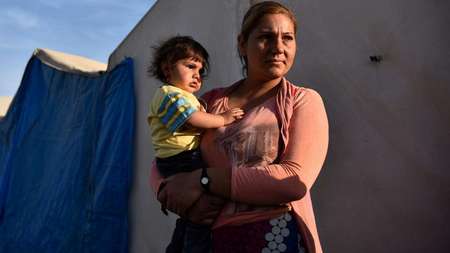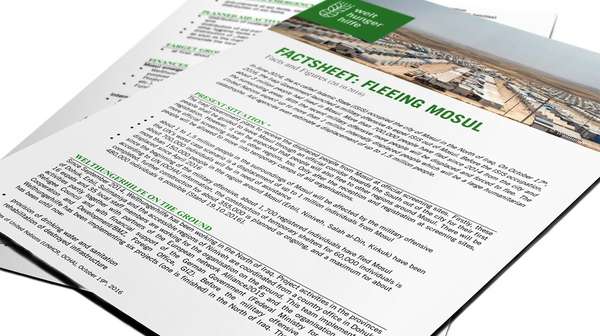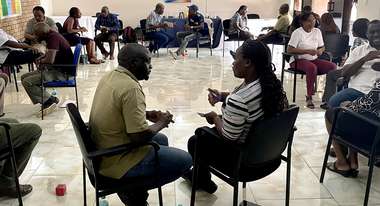On 9th of June the Iraqi Prime Minster declared Mosul as liberated from ISIS.

Securing Survival
Fleeing From War and Violence
Iraq continues to be a country at war. Since August 2014, when the “Islamic State” (IS) began its advance in north-western Iraq, several million people have been displaced. Many found refuge with host families, and others live in camps or cellars and backyards. The strain on the population is huge. The people who are still fleeing often lack food, drinking water, sanitation facilities, basic medical care, clothing and blankets. They need education and employment. Welthungerhilfe provides local support by distributing the most urgently needed goods.
With the developments of 2017, tens of thousands of people can return to the regions retaken from IS, including the areas surrounding Nineveh and Mosul. Now it is time to rebuild damaged infrastructure, energy supply, schools and roads. However, many aid measures are already underfunded. The challenges are great.
Creating Prospects for Returnees
When refugees decide to return home, they have often lost everything. In the province of Nineveh, Welthungerhilfe and the Gesellschaft für internationale Zusammenarbeit (GIZ) support returnees and remaining residents with Cash for Work measures. Project participants are involved in the rehabilitation of infrastructure while also receiving an income.
Various demographics are actively involved in planning the activities, allowing them to meet their individual needs. This should help reduce the tensions surrounding the coexistence of different local population groups.
Aid packages, water, camps and agriculture: How Welthungerhilfe is helping in Iraq
- Improving living conditions of returnees, displaced people and Syrian refugees in the northern part of the province of Nineveh, which was liberated from IS in 2015: Supporting reconstruction by rehabilitating basic infrastructure with the help of Cash for Work activities, focussing on promoting and restoring social peace between various demographic groups
- Agricultural consultants from the Department of Agriculture and non-governmental organisations, students, farmers as well as female-headed households receive trainings in areas such as resource-efficient technologies, modern farming methods and nutrition. A number of project participants receive support with the development of business models and resources to kick-start their own agricultural businesses.
- Access to clean water is a major problem in many areas in Northern Iraq. As a result, Welthungerhilfe is addressing the following areas with a project financed by the Federal Foreign Office: Providing emergency water; repairing and overhauling water lines; providing emergency toilettes, showers and sanitation facilities in schools and health centres; distributing nappies and other items for babies; staging hygiene education campaigns; improving waste management.







